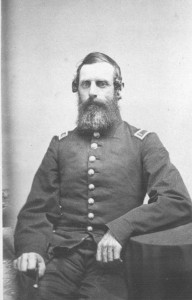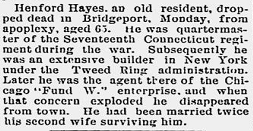Note from 17thCVI: In the previous incarnation of this site we published several pieces submitted by readers of this site. Many failed to make it from the old site to the new. We’ll be finding these stories and bringing them back into the site in the future weeks. This is one such story submitted by long-time reader and contributor Jeff Grzelak (also a long-time 17th CVI reenactor in Florida).
It seems that when the 17th Connecticut Volunteer Infantry was mustered into service in August of 1862 it had its fair share of shady members. Among them was a middle aged merchant by the name of Hanford N. Hayes. He had been appointed Regimental Quartermaster because of his background and many of the men knew him, since he was from Bridgeport along with a majority of others.
Hayes ran his office like a business. Too much so – as he was the Quartermaster he had a free hand when it came to supplies, rations, etc. As nobody watched him, he soon earned the contempt of the men in the ranks for holding back on supplies, then selling them to the men. After only a few weeks his little scam reached the top brass of the regiment. The men grumbled and soon all of the officers suspected him of holding back supplies at the very least, if not covering up a small black market on the side.
A court-martial convened in Virginia at Stafford Court House on December 24, 1862. Colonel Noble of the 17th CVI presided over the proceedings. Several other officers from other regiments within the corps were brought up on charges, but when Hayes came before the court Colonel Noble took a personal interest.
In a report dated April 2, 1863 the findings of Asst. Adjutant General E.D. Townsend, by order of the Secretary of War, paints the picture very well:
CHARGE: “Violation of the 36th Article of War.”
1st Specification: “In this: that at different times and places from the 15th of December 1862, to January 4th, 1863, he has sold, or caused to be sold, provisions belonging to the government of the United States without proper order for that purpose.”
2nd Specification: “In this: that he embezzled & willfully misapplied provisions furnished him by the government of the United States for the subsistence of the enlisted men of the 17th C.V.I., by selling or causing to be sold said provisions at different times and places from the 15th day of December, 1862 to January 4th, 1863.”
3rd Specification: “In this: that having received upon regular provision returns of Capt. Lyman Y. Stuart, Commissary of Subsistence for the 2nd Brigade, 1st Division, 11th Army Corps, Army of the Potomac, full rations of almost all articles of provisions (for the enlisted men of the 17th C.V.I.) by the government of the United States from the 15th of December, 1862 to January 4th, 1863, has withheld such portions of said rations or provisions as to place the men of the regiment on short allowance, and thereby causing them want and suffering, compelling the men of the regiment in many instances to purchase from said Lt. H.N. Hayes, provisions which he had defrauded them of, in order to their subsistence.”
To which Lt. Hayes pleaded “not guilty”.
The Court having maturely considered the evidence adduced finds the accused, Lt. H.N. Hayes, Quartermaster, 17th C.V.I., as follows:
Of the 1st specification, “Guilty”
Of the 2nd specification, “Guilty”
Of the 3rd specification, “Not Guilty”
Of the Charge, “Not Guilty”
And the Court does therefore sentence Lt. H.N. Hayes, Quartermaster, 17th C.V.I. “At his own expense to make good the damage to the United States and to forfeit all his pay, and to be dismissed from service“.
The Major General commanding the Army reviewed the whole case and then sent it in to the President. The sentenced was suspended under the 89th Article of War until it was mitigated, at which time it was approved by the President except for the dismissal from service. It seems that Lt. Hayes was very lucky, but his reputation was tarnished, and under growing criticism he resigned just after Gettysburg, on July 18, 1863.
He was replaced 9 weeks later by Quartermaster Sergeant John S. Ward, who remained with the unit without incident until the regiment was mustered out of service in July 1865.


